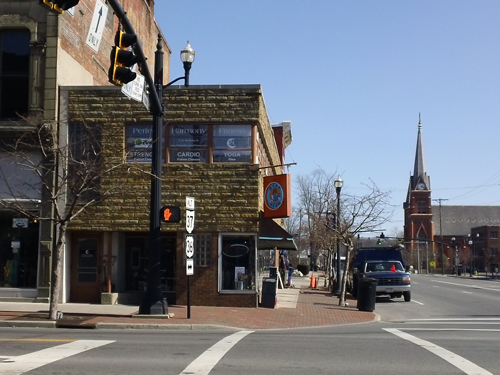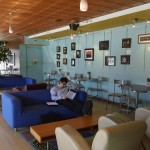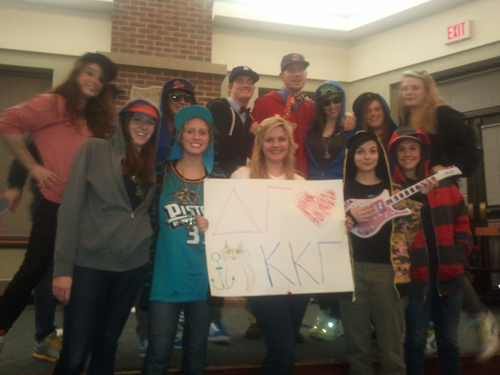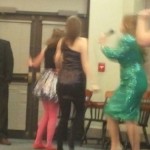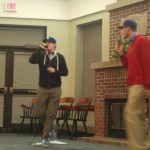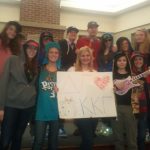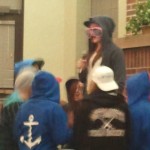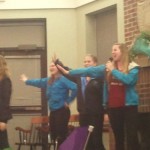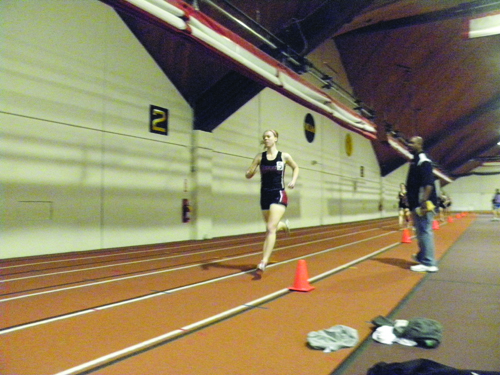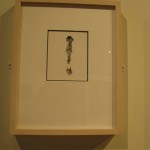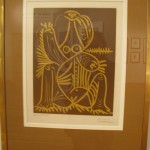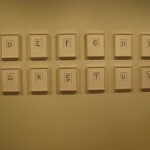President Rock Jones and Residential Life have recently approved the House of Black Culture to become a themed house, bringing pride to both current residents and alumni of the house.
As a themed house, the House of Black Culture (HBC) will no longer be required to apply for renewal, a process for all Small Living Units (SLUs). HBC will be ensured a permanent presence on campus.
HBC is currently a SLU with Heritage House status, meaning the house has functioned and contributed to the OWU community for an outstanding period of time. Senior Samantha DeJarnett, HBC moderator, said Heritage Houses are SLUs deemed by the university to have mission statements that are important to keep on campus both in the present and in the future.
The HBC’s mission statement focuses on creating a safe haven for all students on campus and promoting African American culture and awareness through programming and discussion.
“This is a very positive transition for the HBC and myself, and our members are extremely excited that the university sees our house as important enough to always have around,” DeJarnett said.
Dejarnett said the only other change to the HBC is that the house moderator’s title will be changed to Resident Assistant (RA).
Vernita Johnson (’95), a former HBC resident, said she was “pleasantly surprised” to hear of the house’s new status.
“I have never imagined OWU without the house,” Johnson said. “I’m surprised to hear the news because I never considered the possibility of OWU not having the house on campus.”
Johnson said she sees the HBC as an important living option because it was her “home away from home” and provides residents with a strong sense of connection to one another.
“My freshman year was kind of awful,” she said. “A lot of the white students had never been around people of color, and then when I came home from class, I felt I never had a break from teaching white people about being black,” she said.
Dan Sturkey (’84) said life was different during his years at OWU, and he appreciates the social progress that both the HBC and campus have made since he graduated.
Sturkey’s wife is also an HBC alum (’83). During their years at OWU, the house was not co-ed, and male and female residents took turns living in the house every other year.
“I think it’s great to see it co-ed,” he said. “You would never see diversity or co-eds in one building. Things have changed, and I don’t think that would have happened if OWU wasn’t so open and liberal in thought.”
Sturkey said he believes the HBC’s new title of a themed house is an honor because it exemplifies OWU’s true commitment to diversity.
“Looking back, there was a separation between blacks and whites on campus,” he said. “Now that has dissolved, but the house still has the capability to bring people together. I think it is a living example of a social evolution.”
Saying farewell to memorable college years
Sitting here in Beeghley Library writing this editorial, I start to become nostalgic by the thought that I have only three months left to sit in this library doing schoolwork.
The bittersweet emotions of moving on from college and into the real world are starting to set in. As I send out applications for summer internships, it begins to feel real.
Every time I click the “Submit Application” button on my computer, the future inches closer and closer.
OWU is my home. It has been for the past four years, and I have found an incredible sense of comfort here.
I have always been horrible at saying goodbye to people, places and even things. I cannot imagine walking around next year and making it ten steps without seeing a familiar face waving and smiling at me. The friends you make in college will always hold a special part in your life, but the idea of not being able to see them everyday is heart wrenching.
Saying goodbye to not only friends, but nights spent in Clancey’s or The Backstretch will be reserved for the times when group reunions come back to pay the university a visit.
No more Beehive Books or Mean Bean study sessions.
No more Blackboard assignments or articles to read on ERes before class.
No more daily iced coffee visits in the Zook Nook or late night caffeine with Big E.
No more signing up for classes to take in the next semester, because the next semester is life.
Having learned so much at this university, I know that when I walk across the stage this May I will be prepared for the next chapter.
Understanding that journalism is a hard industry to get into these days, the feelings of positivity come in waves.
OWU has taught me the necessary skills I need to be a professional, and understand the challenges that I will soon endure.
Independence is one of the biggest skills I’ve learned these past four years. Freshman year brought me to this new and exciting campus with a shyness that I now have shed.
It has made me able to speak up in classes, take control in group projects, and volunteer myself for more things than I could have ever imagined before.
Setting up meetings with my professors during their office hours is something I would have never considered doing my freshman year.
In order to achieve goals, you must put yourself out there. You must believe that you are more than what you give yourself credit for. I know that I pushed myself and challenged my insecurities.
This May I will leave OWU with the satisfaction of trying out many things.
Playing a sport, taking classes I would have normally avoided such as computer science or linguistics, working in Special Olympics, making strong relationships and friendships that will last beyond OWU are all things that I have learned to love and find the most difficult to say goodbye to.
If I hadn’t had any of these experiences, I wouldn’t be the independent woman I am today.
I will miss OWU next year so much and am so grateful of all it has offered me.
Tragic accident serves as time of remembrance
The tragic car accident that occurred at Bowling Green State University involving members of the Alpha Xi Delta sorority should serve as a reminder to us all in the Greek community about the importance of valuing our fellow members.
Five members of the Alpha Xi Delta sorority were struck by a driver going the wrong way on Interstate 75 South on Friday, March 2.
The sisters were on their way to the airport to embark on a spring break trip in the Dominican Republic with 16 other members of their sorority.
Three were killed and the remaining two were seriously injured.
While discussing this heartbreaking event with my fellow Delta Delta Delta sisters, it allowed us all to reflect on the close friendships we had with one another and the tight bonds created between us all through sisterhood.
The idea of an event like this happening to the Greek community at Ohio Wesleyan is completely unimaginable.
When events like this occur, it is so crucial that we use them to help us remember and appreciate the reasons we chose to be a part of the Greek Community and our respective fraternities and sororities at OWU.
We should reflect on the impact that our sisters and brothers have had on our lives.
Being a member of the Greek community grants us the opportunity to be a part of something that is so much larger than ourselves.
Being able to use this tragedy as a tool to help us reminisce on what being a brother or sister means should be the real take-away for all Greeks here at OWU.
Letter to the Editor: Student bashes report on College Republicans
Dear Editor,
This letter is regarding the article “College Republicans given a voice on liberal campus,”.
As I turned to page three of the most recent issue of the transcript this weekend, I was shocked to find what I can only imagine was an unedited blog post from a particularly uneducated freshmen given the full-page treatment, complete with the original poorly-ghosted, noticeably pixelated American flag backdrop that lacks a photo credit.
Whatever this mess was, it certainly wasn’t written by somebody who has taken even introductory journalism, or else it would read like it was written by somebody who has at least a passing familiarity with news writing.
Certainly, someone who knew what they were doing wouldn’t make the outrageous error of referring to a sitting president only by his last name on first reference.
That’s the kind of stuff that gets you accused of being racist, and rightly so, given that it mirrors language used by the Ted Nugent branch of the Tea Party.
A well-edited page would, of course, never have the controversial assertion that this campus is “liberal” serve as both lead and headline in a news piece.
It would definitely not follow up such a lead with blatant weasel-wording that wouldn’t last five minutes on Wikipedia, and it would not continue on to what reads like it came from the first chapter of “How to Write An Opinion Piece and Pretend it is News.”
Given that this would be laughed out of the news room of even an above-average high school paper, I have to ask: how did this ever make it to print?
Is the Transcript really so understaffed that nobody has fifteen minutes to review what is going to be a full page article?
I don’t believe malice went into this mistake, just poor editing and a conservative bias on the part of the author.
All the same, a subject like this really should have been treated with care, and, quite frankly, it wasn’t.
A quick straw poll in HamWill about the political leanings of our school got responses, “a little right of center”, “hilariously centrist”, “slightly left-leaning”, “pretty moderate”, and “extremely conservative” (though, to be fair, that last one came from a Jewish-atheistic-communist-hippie-feminist from the east coast).
It seems to me that opinion should stick to the opinion section; that a journalist should be checking their views at the door when they write.
This was not done last issue, and, in my opinion, the overall publication suffered for it.
Sororities need homes of their own
First, a disclaimer: I know very little about Greek life.
I personally don’t understand the allure of joining a fraternity or sorority, and while I admire the effort Greek students put into their respective organizations, I rarely involve myself with that community.
One thing about Ohio Wesleyan’s Greek program that has continually baffled me, though, is the inability of members of sororities to live in their houses.
I know several sorority women, and they are all incredibly dedicated to the cause.
They work tirelessly planning events on and off campus, retreats to bond with new members and casual gatherings to promote not just their own sororities, but Greek life in general.
From my knowledge, it seems being in a sorority is a full-time job.
Why, then, are these steadfast devotees to the Greek community not allowed to live in the houses they pay dues to own and maintain?
I’ve heard several explanations—an old law that designates a house boarding more than eight unrelated women as a brothel is the most widely offered, supposedly out of its humor.
I find this explanation to be disgusting. An archaic statute that implies women become prostitutes when eight or more of them decide to live together is inherently misogynistic.
This law can’t exist anymore, right? Isn’t there a more sensible, progressive elucidation for why OWU’s sororities are nonresidential?
Indeed there is. According to Greek Life Coordinator Dana Behum, the sorority houses on Winter Street are not owned by the university, but by the national entities of the organizations or local alumni.
“OWU has no part in their property management decisions,” she said.
ResLife Interim Assistant Director Drew Peterson added the houses would require expensive renovations for them to meet the standards set by the national sororities.
Therefore, he said, even if the university cleared OWU members to live off-campus, they most likely wouldn’t be able to because the national organizations wouldn’t be willing to invest in making the houses habitable.
While this is an infinitely more logical explanation than the brothel law, to me it still doesn’t justify keeping sororities from living in their houses.
At OWU, the benefits of membership are disproportionately greater for the latter than the former.
Fraternity brothers get to live in fully furnished on-campus houses.
Yet their dues are lower than those for sororities.
The fact that sorority women have to pay to keep up properties they can’t even live in, quite frankly, doesn’t make sense to me. Higher dues and an obligation to pay for university board create an apparent cost disparity that’s quite alarming.
Both the university and the national sororities with OWU chapters should be more sympathetic to this. It is in their interest to reward and encourage the commendable work our sororities do for the campus community and Delaware.
To ignore their efforts would be truly tactless.
A financial partnership between the university and the national sororities, especially those with local alumnae, would not be infeasible.
It seems to me that if the national organizations were not fiscally alone in making proper renovations to the houses, they would be more inclined to do so and thus alleviate the financial burdens of the women that work so zealously for them.
Moreover, the university needs to put an end to the myth of the brothel law and make students aware of the reasons Greek Life and ResLife gave me for having nonresidential sororities.
While it seems funny on its face, the fact that it is the prevailing explanation makes Ohio Wesleyan and Delaware alike seem sexist and backward. I’m the first to admit Delaware isn’t the most cultured town, I don’t feel it’s right to give undue attention to misogynistic rules that allegedly existed here.
Nonresidential sororities are an unfortunate and unjust reality at Ohio Wesleyan, but they don’t have to be a permanent fixture. It’s up to the university and the national sororities—the institutions with the power to make a change—to create greater equity in our Greek community.
Brewing a brand new Bean: New owners plan to renovate Mean Bean coffee house
The recent exchange in ownership of The Mean Bean will bring with it some new changes to the eclectic coffee shop, including a bakery, intended to generate more business from students.
Christie Engler and her husband bought the coffee shop last November.
“We’d been looking for a business for a couple of years,” Engler said. “We really liked the idea of a coffee shop. My husband is actually a baker, so we wanted to do something that would be coffee and where he could incorporate baking.”
“We were looking for a couple of years, and we really didn’t like the idea of a franchise because you have to keep giving them your money. We were looking for an established business, and we just happened to find the Mean Bean, and it’s in a great location and has a lot of potential.”
Manager Samantha Tackett, 22, has been working at the Mean Bean for three years, and said the selling of the Mean Bean came as no surprise.
“The past owner had wanted to sell for quite a while,” Tackett said. “He just let it go towards the end there, so we were all hoping he would sell it pretty fast.”
The new owners are currently planning changes for the coffee shop, including renovations and a new working space.
“Right now we are in the process of renovating the basement, and that is going to become the baking area,” Engler said. “We’re planning on a main floor renovation hopefully this year, just to update it and what not. From there, we don’t really know. Those are the immediate plans.”
Tackett said the floor plans for the Mean Bean are going to see some serious changes as well.
“It’s going to be a total re-haul,” Tackett said. “The walls are going to be different, the flooring, all of the architecture is going to change…It’s going to be cool. It definitely needs it, I think.”
Changes might also extend to the name on the sign out front.
“We may change (the name),” Engler said. “It’s in conversation right now. There were two locations. There’s also one in Powell, and now they’re under a different ownership.”
“We wanted to make sure we established ourselves differently from them. We’re hoping in the future to open more locations around central Ohio. If we’re going to try and start a brand and everything we may start fresh with our own name.”
Sophomore Katasha Ross used to frequent the Mean Bean with friends in the last academic year.
“It was a place to hang out on Friday night before you went to dinner or after you went to dinner,” Ross said. “It was one more place to hang out over in that area of town. There was always a cool place to hang out and relax. It always had a friendly atmosphere.”
One thing the Englers might want to note is the location of the Mean Bean’s bathroom.
“It would be nice if you didn’t have to ask for a key to use the restroom, but I understand why that works,” Ross said. “It’s a little creepy, the restroom.”
Engler also said she hopes their new coffee shop can become a bigger part of the campus community.
“That was one of the reasons we like the location so much is because it’s right down the street from OWU,” she said.
“We want to do more directly with the college and see how we can service the students.”
“In the past they’ve tried to do different things like during exam week. We’ve talkedabout new promotions during exam week and during parent visits and weekends.”
She said she definitely wants more presence on campus and wants to get more business from students.
Tackett said she used to see many students, but the numbers seemed to decrease recently.
“I don’t know if that’s because of the past owner or the people who work here,” Tackett said. “They usually come in a lot during finals week – we stay open 24 hours for them. They usually come in at night.”
Engler also said the biggest goal for the new Mean Bean is to expand, whether they keep the name or not.
“(The Mean Bean) has been going at a steady pace for ten years,” she said. “We just want to grow it and create more awareness in the area, and go from there. I think the on-site baking place will be a big thing.”
The Mean Bean is open 5:30-10 p.m. Mon – Thurs, 5:30-11 p.m. Fri, and 7-11 p.m. Sat and Sun.
Greek life: Fraternity and sorority stereotypes, Kappa Kappa Gamma hosts karaoke event to bring Greek community together for charity
Sorority girls walk arm in arm. They saunter around in clumps and clusters. They giggle, examine their hair and complain loudly about school work.
They also smile and greet each other enthusiastically. Names are screeched from across hallways as girls sprint into each other’s arms.
“You look so cute” and “I miss you in my life” and hugs and kisses are regularly expressed and administered.
This affection is not exchanged merely between members of the same sorority. It’s a Panhellenic affair. Kappa Kappa Gamma, Delta Delta Delta, Delta Gamma, Delta Zeta and Kappa Alpha Theta comprise Ohio Wesleyan University’s sorority community. The hundreds of women who make up this community find themselves able and willing to make meaningful connections with members of sororities outside of their own.
Thursday, Feb. 23, is a busy day in the Hamilton Williams Campus Center atrium. Sorority and fraternity members have made their way upstairs to the Benes Rooms. These “Greek” students have gathered to sing, dance and put on a somewhat cheesy smile for a good cause. Kappa Kappa Gamma is holding their annual Kappa Karaoke event to raise funds for the Reading is Fundamental Foundation, which works to amend illiteracy issues among young children in urban areas.
According to freshman, Tucker Fontanella, a Sigma Phi Epsilon fraternity member, Kappas are the smart girls.
The Tri-Deltas use gimmicks in their Kappa Karaoke act. Umbrellas add color to their performance of “It’s Raining Men” and sophomore, Timothy O’Keefe, a member of Sigma Chi, suggestively removes his jacket and throws confetti in the air during the performance. Theta also enlists the use of a Sig Chi Senior Phillip Forsgren, who is dressed in all black and a pair of sunglasses, stands back and observes the sequin-dressed Thetas shake it onstage.
According to junior and Theta president Amy Siemon, Thetas know how to “play hard.”
33 percent of the OWU campus is Greek, according to Dana Behum, assistant director of sorority and fraternity life at OWU. Behum says that the stereotypes of the different sororities at OWU ebb and flow as new members are initiated while the make-up of the sorority changes. These stereotypes, while a reality nationally, could vary by college. A sorority at one college may be perceived and stereotyped in a totally different light than the same sorority would be at another, according to Behum.
GIRLS SAY
“We hang out with the people we’re most comfortable with, but we do that in real life too. There’s a tendency to gravitate toward people who are like you,” said junior Megan Cook, a member of Delta Zeta.
Cook said DZs are stereotyped as “the nerds who spend their weekends playing monopoly in Welch (Hall).”
“We’re still considered the fat nerds who don’t go out,” said Cook.
Cook is well under 140 lbs.
When Cook went through formal recruitment in the spring of 2010, she had a strong inclination to be a DZ because she had always admired DZ girls. While standing in line to enter the DZ house on the first day of recruitment, Cook heard a girl mutter behind her.
“Isn’t this the weird house?”
Cook said she believes these stereotypes have been breaking down in the two years since she went through formal recruitment due to a progression of new women who have been initiated into the Delta Zeta sorority. She is now the proud president of DZ. She smiles as she discusses her devotion to the sorority that has shaped her life and made her a more confident member of the OWU community.
Siemon, the recently elected president of Kappa Alpha Theta, said she thinks stereotypes are unavoidable and are often true.
“We are all over-involved and control freaks and we all wear scarves,” said Siemon. “But people tend to focus on the negatives.”
Siemon said she thinks stereotypes are far from an all-encompassing reality.
“I’ve heard a lot of stereotypes and I would lie if I said I’ve never repeated them, but I don’t think it encompasses everyone in (every) house. I think … people want to mentally categorize groups on campus.”
Siemon said she believes stereotypes could be removed if the campus community were to look not at groups of sorority members, but at individuals in the groups.
Siemon is friends with girls in many of the sororities on campus and lives with two women who are Tri-Delta members.
Junior and Kappa member Kelsey Brown agrees with Siemon’s sentiments and said she thinks women commonly tend to socialize with those women in their major, regardless of affiliation. Brown cites common personality characteristics and values as reasons for building friendships. Brown is friends with many women in Delta Gamma who share her major of early childhood education.
Brown knew she would be a Kappa but was not convinced the sorority was her top pick. After receiving her bid, however, she was pleased with how the recruitment process turned out. She believes she shares many of the same values as her sisters, but also some of the stereotypes.
“I’ve heard that (Kappas) are kind of awkward and we can’t really carry a conversation,” Brown said. “I’d say these stereotypes are kind of hurtful, but I really am … awkward.”
Brown echoes Siemon’s sentiments that students focus upon the negatives in stereotyping their peers.
“But people are negative today in everything,” said Brown.
Junior Gabriella Melgar, an unaffiliated woman, said she thinks these stereotypes could be broken down if students were to look at the diversity within each sorority. She says there is a conscious decision made by women who choose to affiliate themselves with those they are similar to.
“I think it’s just an issue of ‘do you want to hang out with people that are just like you, or branch out,’” said Melgar.
BOYS SAY
Male students on campus see stereotypes of the different sororities as an obvious reality. They often see these stereotypes as a large problem.
Junior Samuel Irvine, an unaffiliated man, said he believes sorority stereotypes to be a negative issue on the OWU campus and offers solutions to rectify this issue.
“When I hear unaffiliated girls discuss their bids it is disheartening to hear, ‘Delta Zeta is equivalent to a lesbian clan’, or ‘if you don’t have pastel colored attire in your wardrobe forget Tri-Delta,’” said Irvine. “What happened to the sense of community that binds sororities together, not as individual organizations, but as a Greek community as a whole?”
Irvine said he believes that through events planned for the entire Panhellenic community, Greek women can be brought together to realize they share a multitude of similarities, even merely because they are all campus women.
“When women can gather themselves around common issues such as self-defense workshops and workshops that teach women about their bodies they can help eliminate those stereotypes,” said Irvine.
Senior Tyler Hall, an unaffiliated man, said he thinks stereotypes of the Panhellenic community as a whole can be disheartening.
“Most people see pictures on Facebook … and associate it with sororities. For most people, the only time they have visited a sorority house or been around sorority women is at a party,” said Hall. “Most people do not recognize the philanthropic efforts made by women in all of the sororities.”
Hall said this is a shame.
Fontanella, as a member of a fraternity, has heard specific stereotypes of each sorority throughout his freshman year so far. He said he believes some of these stereotypes to be offensive and untrue.
“When I came on my recruiting visit I was told Tri-Deltas are slutty, but this isn’t true of the few friends I have in Tri-Delta,” he said.
Fontanella said he, as a Sig Ep, does not spend time equally with women in all sororities.
“I don’t know much about the Delta Zetas,” he said.
The Sig Eps have only had mixers with Theta and DG.
Sorority members tend to socialize with those fraternity men they are most comfortable around.
Brown enjoys spending time at the Delta Tau Delta fraternity, but believes this preference to be part of a personal connection she has developed with the men there. Cook enjoys spending time with the men of Alpha Sigma Phi and Chi Phi. She would classify these men as “less creepy.”
Junior Corey Castelli, a member of Alpha Sig, said he does not agree stereotypes of sorority-fraternity relations are all negative. He prefers Kappas. He thinks his brothers do as well.
“Kappas are more open and other sorority members are more exclusive,” he said.
Castelli said he does not see an issue in a lack of socialization with members of different sororities.
“We tend to hang out with people who are more similar to us. Some groups may just be incompatible,” he said.
Castelli said believes there is a history of friendships between certain sororities and fraternities.
“We hang out with mutual friends and to make a bridge between a new sorority and fraternity is more difficult and is therefore not usually done.”
CAN’T BE DENIED
Cook said she sees the stereotypes of her sorority to be a part of the community she connects with. She sees the stereotype that many DZs are members of the LGBT community on campus as a positive aspect of her sorority. Approximately 25 percent of the Delta Zeta sorority identifies as LGBT.
“We’re proud to collect such a diverse crowd,” said Cook. “LGBT women gravitate towards (our sorority) because we create a supportive environment.”
Cook herself finds support in this community as well. She refers to one of the couches DZ sit at during the lunch hour as “DZ land.” She said she feels most comfortable there.
She wants to make some changes in the way her sisters view themselves and their sorority.
“I want us to stop worrying (about stereotypes). I think its way more important to build sisterhood from within and the rest will follow.”
Behum is not especially concerned with the current sorority stereotypes either. She says students will move on.
“Any given sorority changes with each new pledge class, and the cycle of stereotyping continues,” she said.
Behum said professors have even been known to see girls differently based upon which sorority they belong to.
“These impressions are not always true, though,” said Behum.
She cites this as a problem, a problem related to the fact that there lies great diversity between the members of any given sorority from those of another sorority. One member should not be judged based upon the stereotypes put upon the sorority she belongs to as a whole.
Craig Ramsay, professor of politics and government at OWU, has never personally encountered this problem.
“I have been a college professor for over thirty years and I have never perceived sorority women as having any particular pattern of characteristics,” said Ramsay. “Of course, I only on a rare occasion even know which women students belong to a sorority.”
Jeffrey Nunemacher, chairperson and Parrott professor of mathematics and computer science, does not even have an opinion on the issue.
Overall, Behum thinks sorority life is largely beneficial for any woman. Behum herself was a sorority member at Bowling Green State University.
Behum believes, as Brown does, that values and strong friendships bind members of one sorority together, not stereotypes. OWU sorority women should be proud of their ability to associate well with girls in any sorority.
The euphoric, friendly and positive environment at Kappa Karaoke is a testament to this. Girls should focus upon building Panhellenic spirit and disregard any stereotypes. But Behum, as well as Brown, Siemon, Cook, Hall, Irvine, Fontanella, Melgar and Castelli cannot deny their existence.
Theatre and dance prepares for the opening of Orchesis 2012

Ohio Wesleyan’s theatre and dance department is preparing for the annual student dance company performance of Orchesis coming up this weekend.
With talk of having new student choreographers and guest choreographers to help run the show, students and faculty shared their excitement for this year’s performance. Many students, especially those in the show, however, expressed the hard work involved with such a presentation.
Senior Edmund Howland, a lighting designer for the show, opened up about his preparations for the upcoming performance.
“Dance is unlike any other art form,” said Howland, “it’s all about creating those moments on stage and capturing those dances.”
Howland said that he and the other designers have worked very closely with the show’s choreographers in order to get these moments down correctly and with much precision.
“I guess it’s just the perfectionist in me,” he said.
According to both the students working behind the scenes, and those practicing on stage, the number of hours that go into a show like this one simply become more and more as it nears opening night.
“Hours per week range between 20-30….some weeks even more,” said Junior April Warner, one of the student choreographers.
The dedication to the show is evident, according to dancers such as Warner and Junior Jordan Ahmed, despite the heavy activity.
Ahmed said that most of his lunch hours and free time, now that the show is so close to opening, have been given over completely to dancing and rehearsing for the show. For multiple dancers, including Warner, each rehearsal and practice is somewhat unexpected.
“Practices vary depending on the student, guest, or faculty choreographer,” said Warner. “Some choreographers know exactly what they want and the rehearsal process is about them teaching and creating what they want from us. Other choreographers have a general idea that they need to develop more via the use of improvisation with dancers.”
Others working on the show, including Howland, agree that having these extra guest choreographers has been a great experience and a big help in making the final preparations for the show.
Although these students were asked about any sort of pressure or anxiety that may come along with putting on such a huge show, they said that they were pretty calm about the performance.
“I have had a lot of experience with this show,” said Howland. “I am not nervous about the performance at all.”
The goals and expectations for the show, according to everyone involved, include that the audience is enthusiastic and excited to see what the dance company has to offer this year.
“It’s about creating something that we, as well as the audience, can be proud of,” said Howland.
“I expect that we will make the audience laugh, cry, smile, gasp, think, dream, question and in the end, cheer,” said Warner, “Afterwards, I want the pieces we show in Orchesis this weekend to be talked about for days and weeks and months and years to follow.”
Orchesis 2012 will begin at 8 p.m. on Friday, March 2, and Saturday, March 3, at the Chappelear Drama Center. Tickets are $10 for general admission; $5 for Ohio Wesleyan employees, senior citizens, and non-OWU students; and free for OWU students.
Men’s, women’s track clinch NCAC combined events
The Ohio Wesleyan men’s and women’s track and field teams each earned a first and third place finish in last weekend’s indoor NCAC combined events championship at Gordon Field House.
Men’s Heptathlon
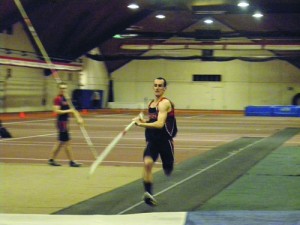
The men’s indoor heptathlon was a two-day event on Saturday and Sunday. It consisted of seven events: 60-meter dash, long jump, shot put, high jump, 60-meter hurdles, pole vault and 1000-meter run.
This is Diehl’s second consecutive win in indoor combined events.
He won the 2011 indoor pentathlon and is the first athlete in conference history to win two consecutive years in a row, Diehl said.
Diehl said the competition this weekend was good, but he credits his teammates for his accomplishments.
“This weekend was great,” Diehl said. “It was awesome to have five fellow teammates there. We all supported and helped each other out. I would have not been able to accomplish what I did today without them. It was great to win but it was also great to see my teammates do as well as they did.”
Diehl said he is pleased with his performance this weekend. Despite falling just short of qualifying for nationals, Diehl said he set personal bests in the 60-meter dash, 60-meter hurdles and the 1000-meter run.
Hunter said he is hopeful that his performance in last weekend’s combined events will carry him through the NCAC championships.
“Personally my result gives me a lot of confidence in how I have progressed though the season,” Hunter said. “I showed myself I was able to perform when it counted.”
The Bishops will compete in the NCAC championship this weekend at Wabash College. Diehl said his performance last weekend will assist the Bishops in reaching their goal of winning the conference championship, but the performance of the rest of the team will be just as important.
“Our track and field team is looking strong,” Diehl said. “We are ultimately trying to win the conference championship this weekend at Wabash College.
“We lost it last year after three consecutive years of winning it. We are looking to regain our spot at the top of the conference.”
Hunter said he is excited for the NCAC championships this weekend. He said the team has broken records and hopes to continue their streak going into the NCAC championships.
“Our cross country team had a fantastic season and have highlighted the indoor season so far by breaking the school record in the distance medley relay multiple times,” Hunter said. “The sprinters are getting faster with every race and the field events are all coming together just in time for conference.”
Diehl said he will be competing in the long jump, high jump and pole vault at this weekend’s NCAC championship.
Sophomore Erik Wall, and freshmen Ethien Morales and Jon Overstreet also competed in last weekend’s heptathlon.
Women’s Pentathlon
Junior Emily Amburgey won the women’s indoor pentathlon on Sunday with a score of 2732. Junior Clare Duffy placed third with a score of 2666.
The women’s pentathlon consisted of the 60-meter hurdles, high jump, shot put, long jump and 800-meter run. 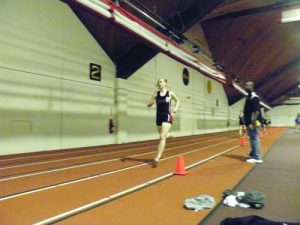
The Bishops swept the 60-meter hurdles with sophomore Sarah Bechtel placing first with a time of 9.61 seconds, Duffy in second at 9.68 seconds, and Amburgey in third at 9.69 seconds.
Bechtel also won the long jump with a leap of 15’7”.
Amburgey said the women’s team anticipates the multi-event competitions because they get to compete in a range of events that they normally do not get to participate in.
“The competition is very friendly,” Amburgey said. “Usually it’s the same girls from the same schools every year, so we get to know each other pretty well. I like that we can have good camaraderie with the other competitors because it makes it a lot more fun.”
Amburgey said she had an Achilles tendon injury that kept her from reaching her full potential in the high jump and long jump, but made up for it in the other events to win the pentathlon.
Amburgey credits the rest of her team for her success.
“I think our team’s strong point is our closeness; we are like a family,” Amburgey said. “I know that I would not have done as well as I did yesterday if it weren’t for the other multi-eventers and my teammates that came to support. The support really does go a long way, and it means a lot to us.”
Duffy said she hopes to carry her momentum from last weekend’s multi-events to the NCAC championship this weekend.
“This is the best I’ve placed in the multi-events in the past three years so it’s a great start to this coming weekend and the rest of the conference meet,” Duffy said.
Duffy said the women’s team is in great shape to bring home the NCAC championship this weekend.
Picasso, Wegman paint a permanent portrait in Ross Art Museum
Staff and students at Ohio Wesleyan are working hard to put together a permanent art collection at the Richard M. Ross Art Museum.
The Ross Art Museum is now displaying works from Picasso, as well as the most recent addition of William Wegman’s photographs.
William Wegman’s work is called Letters, Numbers, and Punctuation. All three displays were done as silver gelatin photographs using dogs to form the entire alphabet, numbers and a large display of punctuation marks. These three selected works consist of multiple frames and were created by Wegman in 1993.
What students, staff and professors are most excited
about is the development of a permanent collection to be available at the museum for the campus community.
Taurey Overturf is one of the students who has been working with the displays and was excited for the new collections.
“I am currently enrolled in a gallery management class so I work with Justin Kronewetter and help install the shows,” she said. “We actually have a ton of really neat paintings, prints and photos in the permanent collection. The goal is to get pictures so that the professors will have access to the artwork and use in the classroom.This is the first time that there had been a permanent exhibition show. Justin Kronewetter has built this museum permanent collection up from the beginning.”
Overturf is also familiar with the other artwork in the museum.
“The exhibition with all the paintings is from an artist in Cleveland. He uses no reference, all his works are purely from his own imagination, there tends to be a dystopia in the overall feeling from his art work,” she said. “The clay pieces in the middle gallery are a great break up from the rest of the two dimensional work, and the artist finds her inspiration from nature with its organic forms.”
“A passion of mine is art and I recently went over to the Ross Art Museum to see some of the paintings and photographs that are on display right now,” said sophomore Katherine Watson. “I was very impressed with the collections the museum had out because I had never been in that building before.”
